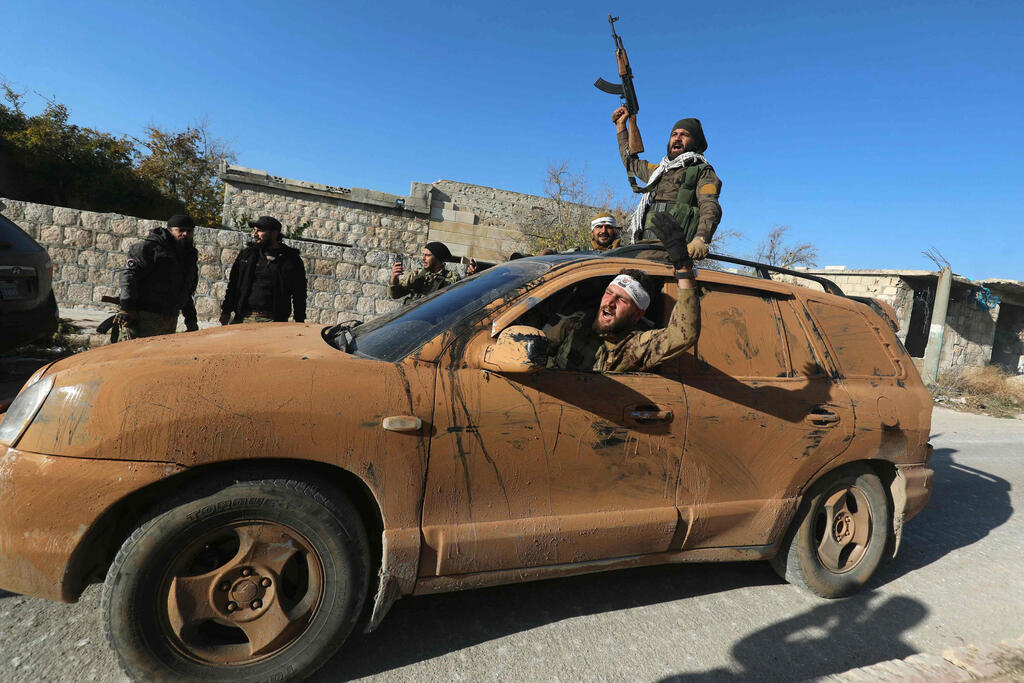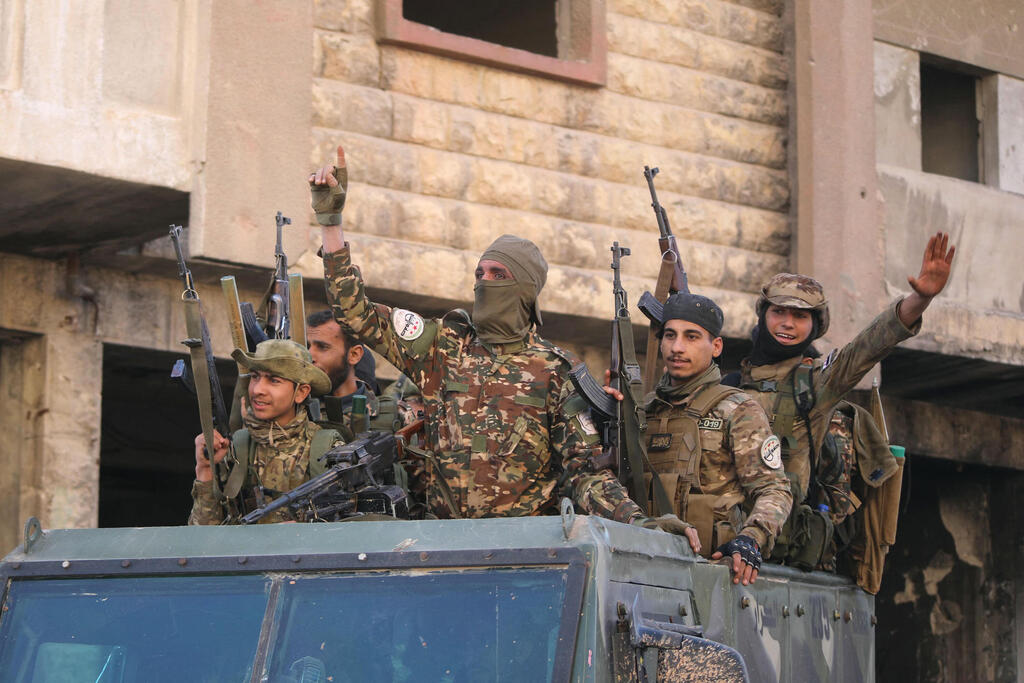Getting your Trinity Audio player ready...
When discussing the Syrian "rebels" currently engaged in combat against President Bashar al-Assad’s regime and its supporters, the reference is to a diverse array of groups with varying allegiances, many of which have evolved over the prolonged civil war. Among these, Jabhat al-Nusra, initially established during the early stages of the conflict as al-Qaida’s Syrian affiliate, played a prominent role in the fight against Assad. Over time, the group demonstrated its ability to control territory and later rebranded itself as Jabhat Fateh al-Sham in 2016, claiming to sever ties with al-Qaeda. In 2017, it merged with other factions to form Hay’at Tahrir al-Sham (HTS), now a coalition of Sunni rebel groups.
HTS rebels celebrating in Aleppo
On Saturday, the Syrian newspaper Al-Watan, citing "special sources" from Idlib, reported that "a central headquarters of Jabhat al-Nusra in Idlib was attacked, with indications that al-Julani was inside the building." According to the report, the targeted site was heavily secured, with strict measures in place preventing civilians and even members of the organization from approaching. It remains unclear whether al-Julani was killed in the attack.
Hay’at Tahrir al-Sham (loosely translated as "The Organization for the Liberation of the Levant"), known internationally by its acronym HTS, is currently the leading faction fighting against the Syrian regime and pro-Iranian militias. Exploiting the weaknesses of the Shiite-Iranian axis, HTS has rapidly expanded its territorial control, capturing numerous villages in the Idlib, Aleppo, and Hama regions in coordination with other opposition forces.
The current military commander of Hay’at Tahrir al-Sham, Abu Mohammad al-Julani, previously served as the Emir of Jabhat al-Nusra from 2012 to 2016. His real identity remains a subject of speculation, with some sources identifying him as Ahmed Hussein al-Sharaa and others as Osama al-Wahdi. Reports about his life are contradictory, adding to his enigmatic reputation.
According to Arab media, al-Julani was born in either 1981 or 1982 in Deir ez-Zor, Syria, and grew up in the Idlib region. He initially studied medicine but dropped out and joined al-Qaida in Iraq in 2003 following President Bush's invasion, where he became close to the infamous Abu Musab al-Zarqawi, the group’s leader. After the latter's assassination in 2006, al-Julani relocated to Lebanon but later returned to Iraq, where he was detained by U.S. forces and released in 2008.
Following his release, al-Julani resumed his activities with the Islamic State of Iraq under Abu Bakr al-Baghdadi. In August 2011, amid protests against Assad, al-Julani was sent by al-Qaeda to Syria to establish a branch of the organization. In 2012, he founded Jabhat al-Nusra, calling on Syrians to wage jihad against the Assad regime. However, al-Julani later rejected an attempt by al-Baghdadi to merge the Islamic State of Iraq with Jabhat al-Nusra, instead pledging exclusive allegiance to Ayman Al-Zawahiri, then-head of al-Qaeda, who himself was assassinated in a US strike in late of July of 2022.
Over time, Jabhat al-Nusra emerged as one of the most powerful armed factions in Syria. The group seized control of Idlib in northwestern Syria, imposing strict governance on the local population. Critics accuse al-Julani of building an economic empire at the expense of civilians, benefiting from revenues from border crossings, control over oil companies, and dominance in agriculture and trade. In recent months, protests have erupted in the Idlib region, with demonstrators demanding al-Julani’s resignation.
In 2016, Jabhat al-Nusra rebranded itself as Jabhat Fateh al-Sham, claiming to distance itself from al-Qaeda. The following year, it merged with other groups to form Hay’at Tahrir al-Sham. Despite these changes, the United States and the United Nations continue to classify HTS as a terrorist organization.
Al-Julani has drawn ideological distinctions between Jabhat al-Nusra and the Islamic State, stating, "We reject the caliphate they declare and view it as illegitimate because it was established on invalid foundations."
HTS, which has taken the lead in the current surprise offensive against Assad’s forces, has long been criticized for its extremist activities. Al-Julani and HTS were early on responsible for deadly bombings, vowed to attack Western forces, confiscated property from religious minorities, and deployed a "religious police" to enforce conservative dress codes for women.
Get the Ynetnews app on your smartphone: Google Play: https://bit.ly/4eJ37pE | Apple App Store: https://bit.ly/3ZL7iNv
Professor Eyal Zisser, a prominent Middle East expert from Tel Aviv University, emphasized in an interview with Ynet that Assad’s regime is currently in a weakened state. The loss of Aleppo to the rebels, Zisser noted, represents a significant blow due to the city’s size and economic importance. He explained that Assad now relies heavily on the support of his allies but warned that airstrikes alone would not suffice to repel the rebels: "If the Russians, Iranians, and Hezbollah do not come to his aid, this could create very negative momentum for Assad. Ultimately, he could find himself confined to Damascus."
Regarding the implications for Israel, Zisser argued: "This conflict is beyond our scope. Israel should avoid direct involvement in a war in another country. Instead, we should seize the opportunity to strike at Iranian, Hezbollah, and Shiite militia forces operating in Syria."







